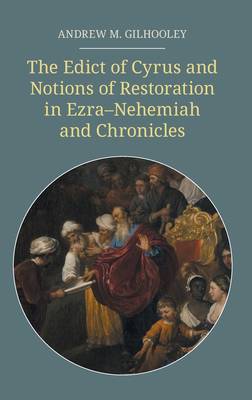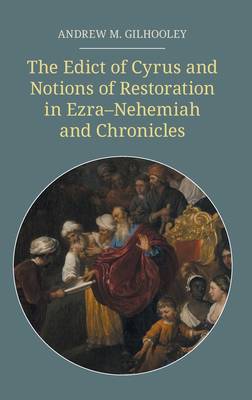
- Retrait gratuit dans votre magasin Club
- 7.000.000 titres dans notre catalogue
- Payer en toute sécurité
- Toujours un magasin près de chez vous
- Retrait gratuit dans votre magasin Club
- 7.000.0000 titres dans notre catalogue
- Payer en toute sécurité
- Toujours un magasin près de chez vous
The Edict of Cyrus and Notions of Restoration in Ezra-Nehemiah and Chronicles
Andrew M GilhooleyDescription
The Edict of Cyrus, both opening Ezra-Nehemiah (Ezra 1:1-4) and closing Chronicles (2 Chron. 36:22-23), serves a different role in each book. In Ezra-Nehemiah, it is a command resulting in a restoration event that has failed, whereas in Chronicles it is a command anticipating a successful future restoration event. In the context of canon, these different uses of the edict are theologically significant, especially in formulating ideas of hope for the future in Chronicles.
While Chronicles is aware that a historical restoration transpired sometime in the past (1 Chron. 3:19-24; 9:2-44), it shares the sentiment of Ezra-Nehemiah, that the return was something of a failure. Through compositional analysis, Gilhooley argues that the edict closing Chronicles portrays the true, or rather, complete restoration not as a past event to be reflected upon but rather one to be anticipated sometime in the future-at a time when Israel was expected to see the establishment of a new glorified temple, political independence, release from servitude, and the blessings of new creation and of new cultic order.
Reading Chronicles as the last book of the Old Testament in accordance with various Jewish witnesses, we find that the edict is transformed into a programmatic conclusion to the canon. Accordingly, the eschatological return to Zion and reconstruction of the temple appear to be dominating concerns of the canonical editors. These verses that bring to an end both Chronicles and the Old Testament as a whole may also be read in dialogue with canon-conscious structural markers elsewhere and, therefore, could be formative in constructing a canonical theology.
Spécifications
Parties prenantes
- Auteur(s) :
- Editeur:
Contenu
- Nombre de pages :
- 178
- Langue:
- Anglais, Hébreu
- Collection :
- Tome:
- n° 89
Caractéristiques
- EAN:
- 9781910928714
- Date de parution :
- 07-10-20
- Format:
- Livre relié
- Format numérique:
- Genaaid
- Dimensions :
- 156 mm x 234 mm
- Poids :
- 426 g

Les avis
Nous publions uniquement les avis qui respectent les conditions requises. Consultez nos conditions pour les avis.






